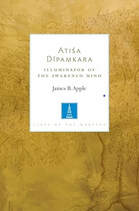|
This presentation will focus on Atīśa Dīpaṃkaraśrījñāna’s (982–1054 CE) system of twenty-one Tārās based on evidence of newly recovered Tibetan manuscripts. It will focus on his systematic ritual evocation of these forms of Tārā based on his Twenty-One Tārās Sādhana recovered from the Tibetan manuscripts. No Indian who visited Tibet in the past one thousand years had a greater impact on Buddhism there than Atīśa Dīpaṃkaraśrījñāna (982–1054).
Atīśa is renowned for his devotion to the goddess Tārā who appeared in his dreams and visions and bestowed predictions upon him throughout his life. His charismatic devotion to the goddess was the impetus for the faithful worship of Tārā in Tibetan Buddhist culture since the mid-eleventh century. Atīśa’s lineage tradition of Tārā is the most distinguished among the five teaching traditions of Tārā in Tibet. The entire ritual edifice of worshiping Tārā in Tibet is built upon Atīśa’s major works on the goddess. Atīśa’s praise of the “Twenty-One Tārās” is iconographically one of the most popular in Tibetan painting and culture.
Atīśa is renowned for his devotion to the goddess Tārā who appeared in his dreams and visions and bestowed predictions upon him throughout his life. His charismatic devotion to the goddess was the impetus for the faithful worship of Tārā in Tibetan Buddhist culture since the mid-eleventh century. Atīśa’s lineage tradition of Tārā is the most distinguished among the five teaching traditions of Tārā in Tibet. The entire ritual edifice of worshiping Tārā in Tibet is built upon Atīśa’s major works on the goddess. Atīśa’s praise of the “Twenty-One Tārās” is iconographically one of the most popular in Tibetan painting and culture.
About James B. Apple:
James B. Apple is Professor of Buddhist Studies at the University of Calgary. His research focuses on the critical analysis of the Mahāyāna sūtras and topics within Indian and Tibetan Buddhism. He is also a widely published author and is a leading expert on Atīśa’s life and teachings. His books include Jewels of the Middle Way: The Madhyamaka Legacy of Atīśa and His Early Tibetan Followers, A Stairway taken by the Lucid: Tsong kha pa's Study of Noble Beings, and Stairway to Nirvāṇa.
James B. Apple is Professor of Buddhist Studies at the University of Calgary. His research focuses on the critical analysis of the Mahāyāna sūtras and topics within Indian and Tibetan Buddhism. He is also a widely published author and is a leading expert on Atīśa’s life and teachings. His books include Jewels of the Middle Way: The Madhyamaka Legacy of Atīśa and His Early Tibetan Followers, A Stairway taken by the Lucid: Tsong kha pa's Study of Noble Beings, and Stairway to Nirvāṇa.
…Atīśa has always been dear to the hearts of Tibetans, and by bringing his words and deeds to life, Apple shows us precisely why this is so—and why we ourselves should look to Atīśa for guidance.” —Roger R. Jackson, Professor Emeritus of Asian Studies and Religion, Carleton College

The presentation will largely focus on Atīśa’s systematic ritual evocation of these forms of Tārā based on evidence of newly recovered Tibetan manuscripts.
The presentation will also reference Prof. Apple’s acclaimed work, Atīśa Dīpaṃkara: Illuminator of the Awakened Mind (Shambhala, 2018). We encourage you purchase this amazing work which is composed for a general audience.
Order direct from Shambhala here:
https://www.shambhala.com/authors/a-f/james-b-apple/atisa-dipamkara.html
The presentation will also reference Prof. Apple’s acclaimed work, Atīśa Dīpaṃkara: Illuminator of the Awakened Mind (Shambhala, 2018). We encourage you purchase this amazing work which is composed for a general audience.
Order direct from Shambhala here:
https://www.shambhala.com/authors/a-f/james-b-apple/atisa-dipamkara.html
Registration:
Advanced registration is required.
We offer all Dharma teachings and center events on a “dana” basis. This means we’re grateful for your generosity but there is no required cost to attend and no one is turned away for lack of funds.
Suggested donation amounts are provided, and we welcome you to offer what you can to help us sustain our programming and make the dharma and events like this possible. And of course, ordained sangha (ordained nuns and monks) are always welcome free of charge.
If you're not donating at this time but would like to attend, please email [email protected].
Advanced registration is required.
We offer all Dharma teachings and center events on a “dana” basis. This means we’re grateful for your generosity but there is no required cost to attend and no one is turned away for lack of funds.
Suggested donation amounts are provided, and we welcome you to offer what you can to help us sustain our programming and make the dharma and events like this possible. And of course, ordained sangha (ordained nuns and monks) are always welcome free of charge.
If you're not donating at this time but would like to attend, please email [email protected].
